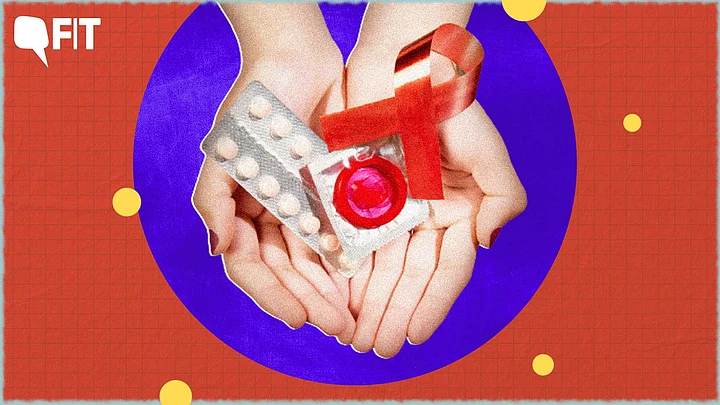The joint United Nations programme on HIV and AIDS, UNAIDS, suggested that AIDS could be globally eliminated by 2030, in a recent report, released on 13 July.
“Botswana, Eswatini, Rwanda, the United Republic of Tanzania, and Zimbabwe have already achieved the “95-95-95” targets. That means 95 percent of the people who are living with HIV know their HIV status, 95 percent of the people who know that they are living with HIV are on lifesaving antiretroviral treatment, and 95 percent of people who are on treatment being virally suppressed.”UNAIDS Report
If everyone who has contracted HIV and is suffering from AIDS is recognised and put on treatment, the circuit can be closed, and the disease eliminated.
So then, why do experts feel this is too good to be true? The story is in the numbers, and experts help FIT decode.
2023 India: What Does The AIDS Situation Look Like?
Globally, one person lost their life to AIDS every minute in 2022, according to the UNAIDS report. Around 9.2 million people cannot access treatment, and over 6,00,000 children still live with HIV.
On the plus side, the number of people on antiretroviral treatment rose from 7.7 million in 2010 to 29.8 million in 2022 globally.
When it comes to India though, the numbers are staggering. In 2022, an RTI query to the National AIDS Control Organisation revealed that over 17 lakh people contracted HIV/AIDS in India in the previous decade.
The year before that, in 2021, there were 41,970 AIDS related deaths (ARD).
More cases being reported is a good sign that people might be getting treatment, but they are a cause of concern too.
Barriers That Need To Be Overcome First
Samit Tandon, the programme lead at Safe Zindagi, a non-profit that works with HIV patients, says that for now, the 2030 goal seems "a bit too optimistic."
He tells FIT that there are multiple hurdles for which the simple answer is awareness. These hurdles include:
The hidden population, ie, people who don’t know what HIV is and wouldn’t even consider getting tested for it
People who don’t follow up on treatments or medications
People who start treatment and drop it midway
“There are at least 20-30 percent such cases where people drop off the wagon. Due to the stigma associated with it, people prefer going to far off places to get treated, and then factors like distance, time, cost, etc, become the reason they don’t follow up.”Samit Tandon
Debanjana Choudhuri, Director, Programmes & Partnerships, Foundation for Reproductive Health Services India, seconds Tandon. She adds that while these factors do play a role, societal and gender roles too factor in here.
“Men hold the control when it comes to contraceptives in many families,” she tells FIT.
"We need to accelerate the awareness of contraceptives. People don’t even know they have contraception choices. Policy frameworks need to encompass the societal roadblocks that are preventing the elimination of these diseases."Debanjana Choudhuri
Not Enough Being Done to Destigmatise AIDS
Pravin Mutyal, Director, Snehalaya, a non-governmental organisation that works with HIV/AIDS patients, too acknowledges these gaps.
He says that the HIV drugs shortage that began last year is something that patients are still reeling under the impact of.
He adds, “When patients have to restock their medicines more frequently, and go huge distances to buy medicines, they often drop out of treatment.”
But the biggest barrier for HIV patients remains the stigma that they have to fight each day. This is also the reason that a lot of people don’t disclose the condition and end up transmitting it to others.
Mutyal says, "Doctors and nurses often refuse to treat or operate on people who have HIV. The stigma is such that healthcare workers often don’t even touch HIV patients. Access to healthcare services gets cut because of the disease."
He adds that there are barriers at the community level too. "There is no acceptance for HIV patients in our society. No one wants to marry them. It's difficult for them to find educational opportunities or jobs too."
Long Road To Elimination: What Needs To Be Done?
The common consensus among the experts FIT spoke to seems to be that while we are set on the policy front, there are certain things that need to be accelerated on the ground level.
For one, there has to be increased awareness about people living with HIV. In addition to this, educational campaigns about how the disease transmits is another important thing to focus on.
“Today there is no campaign available to tell teenagers that this is something they need to be wary of.”Samit Tandon
Ease of access to treatment is another hurdle that needs to be overcome.
Active measures need to also be taken to destigmatise HIV and AIDS patients to counter the discrimination against them.
Ensure that contraceptives reach the last mile and are accessible to people of all age groups.
Ensure that HIV/AIDS patients have support systems and communities where they can not just seek help but also the right kind of information.
However, Mutyal adds that there are, after all, some policy measures too that need to be reconsidered. He tells FIT,
“There should be adequate funds for NGOs and non-profits working with HIV patients so that help reaches these people in a timely manner. And the committees making policies for patients should increasingly include people working at the grassroots level so that the decisions are more informed.”
An earlier UNAIDS report had suggested the use of “science and gender-equality communication,” to spread awareness and make treatment accessible.

